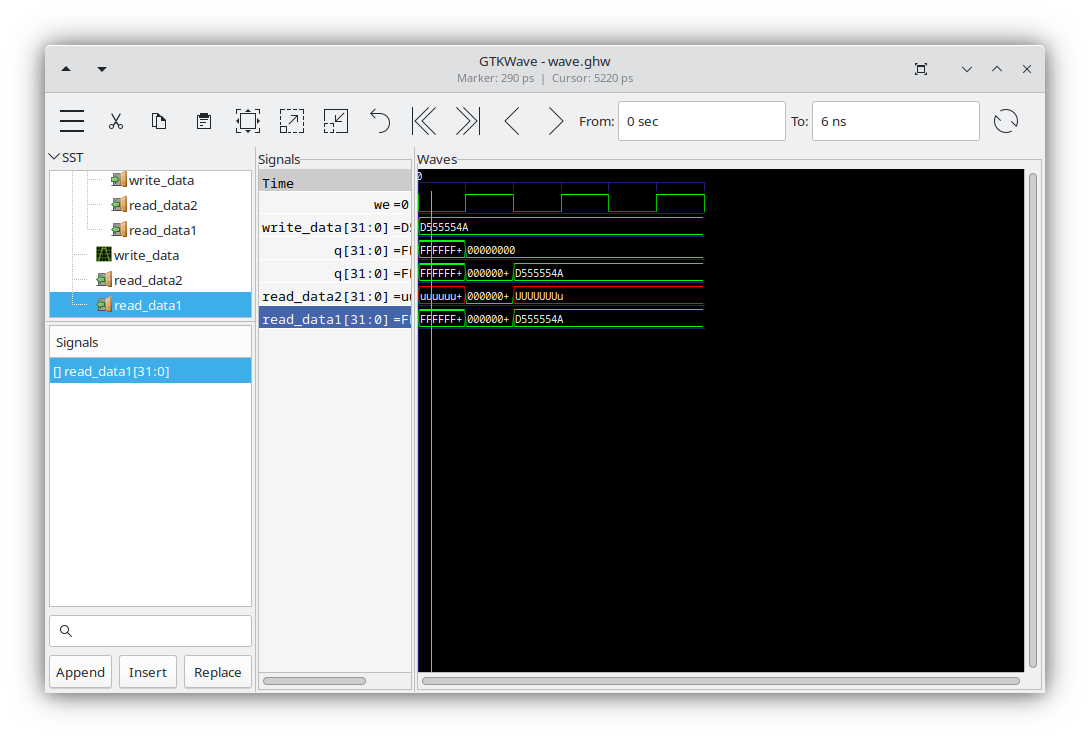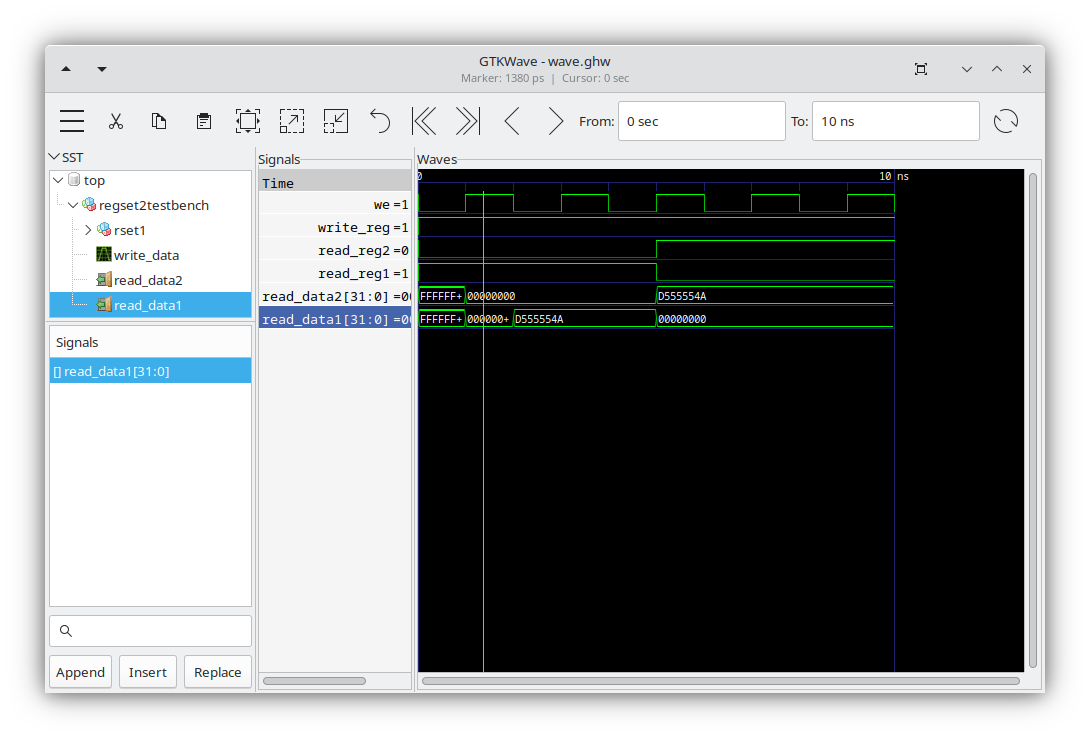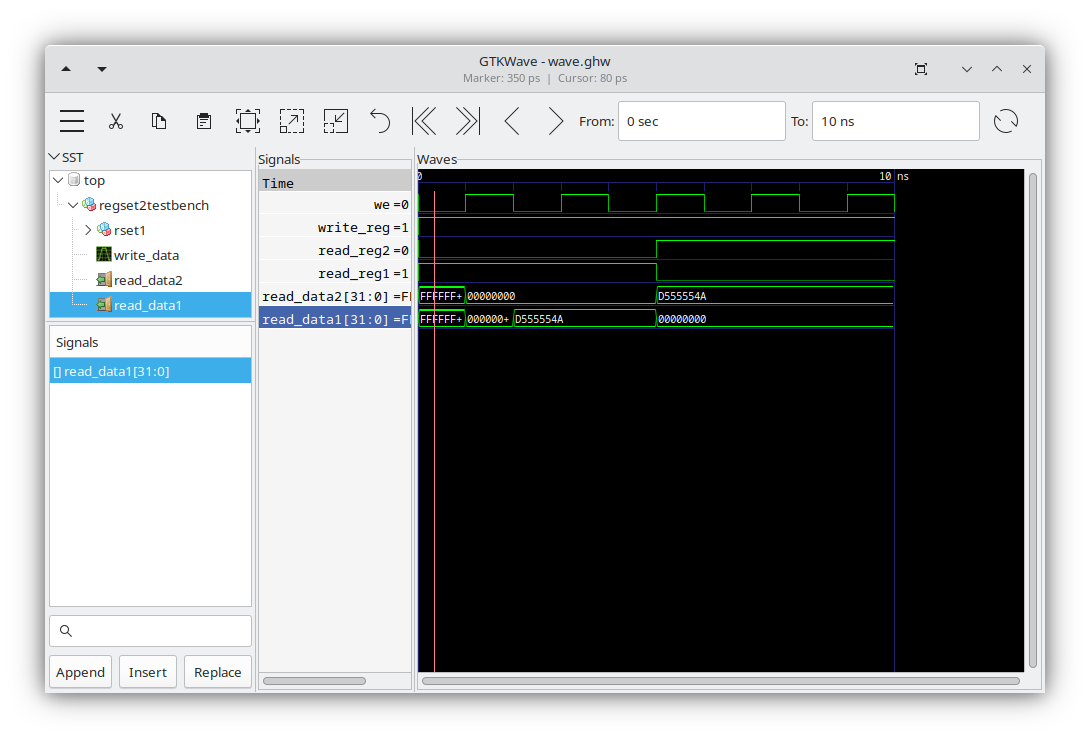Also, ich sitze jetzt auf dem Holzmarkt und jetzt mache ich den Registersatz fertig.
Ah, es sieht so aus, als hätte ich den Fehler gefunden, er liegt in der Testbench. CLK ist postivie Taktflanke. Die Testbench ging nicht weit genug.
Nein, es scheint zu tun, die Testbench war falsch.

Also, es tut doch, sorry, ich war draussen, das Smartphone hatte Akku leer und ich keine Internetverbindung


Es tut, die Testbench war falsch.


Code: Alles auswählen
-- so ist sie richtig
architecture behaviour of regset2testbench is
component regset2
port (
read_data1: out std_logic_vector (31 downto 0);
read_data2: out std_logic_vector (31 downto 0);
write_data: in std_logic_vector (31 downto 0);
read_reg1: in std_logic;
read_reg2: in std_logic;
write_reg: in std_logic;
we: in std_logic
);
end component;
signal write_data: std_logic_vector (31 downto 0);
signal read_reg1: std_logic;
signal read_reg2: std_logic;
signal write_reg: std_logic;
signal we: std_logic;
begin
rset1: regset2 PORT MAP (read_data1=>read_data1, read_data2=>read_data2, write_data=>write_data, read_reg1=>read_reg1, read_reg2=>read_reg2, write_reg=>write_reg, we=>we);
we <= '0' after 0 ns, '1' after 1 ns, '0' after 2 ns, '1' after 3 ns, '0' after 4 ns, '1' after 5 ns, '0' after 6 ns, '1' after 7 ns, '0' after 8 ns, '1' after 9 ns, '0' after 10 ns;
write_reg <= '1' after 0 ns;
read_reg1 <= '1' after 0 ns, '0' after 5 ns;
read_reg2 <= '0' after 0 ns, '1' after 5 ns;
write_data (0) <= '0';
write_data (1) <= '1';
write_data (2) <= '0';
write_data (3) <= '1';
write_data (4) <= '0';
write_data (31) <= '1';
write_data (5) <= '0';
write_data (6) <= '1';
write_data (7) <= '0';
write_data (8) <= '1';
write_data (9) <= '0';
write_data (10) <= '1';
write_data (11) <= '0';
write_data (12) <= '1';
write_data (13) <= '0';
write_data (14) <= '1';
write_data (15) <= '0';
write_data (16) <= '1';
write_data (17) <= '0';
write_data (18) <= '1';
write_data (19) <= '0';
write_data (20) <= '1';
write_data (21) <= '0';
write_data (22) <= '1';
write_data (23) <= '0';
write_data (24) <= '1';
write_data (25) <= '0';
write_data (26) <= '1';
write_data (27) <= '0';
write_data (28) <= '1';
write_data (29) <= '0';
write_data (30) <= '1';
end;Code: Alles auswählen
-- Und hier das ganze - Bereits mit Kaskadierung
library ieee;
use ieee.std_logic_1164.all;
entity rslatch is
port (
r, s: in std_logic;
q: out std_logic
);
end;
architecture verhalten of rslatch is
signal q1, q2: std_logic;
signal init: std_logic;
begin
init <= '0' after 0 ns, '1' after 1 ns;
q1 <= '1' when (init='0') else
(q2 nor r);
q2 <= '0' when (init='0') else
(q1 nor s);
q <= q1;
end;
library ieee;
use ieee.std_logic_1164.all;
entity clockcontrolledrslatch is
port (
r, s: in std_logic;
c: in std_logic;
q: out std_logic
);
end;
architecture behaviour of clockcontrolledrslatch is
component rslatch
port (
r, s: in std_logic;
q: out std_logic
);
end component;
signal r1, s1: std_logic;
begin
rslatch1: rslatch PORT MAP (r=>r1, s=>s1, q=>q);
s1 <= (s and c);
r1 <= (r and c);
end;
library ieee;
use ieee.std_logic_1164.all;
entity dlatch is
port (
d: in std_logic;
c: in std_logic;
q: out std_logic
);
end;
architecture behaviour of dlatch is
component clockcontrolledrslatch
port (
r, s: in std_logic;
c: in std_logic;
q: out std_logic
);
end component;
signal r1, s1: std_logic;
begin
clockcontrolledrslatch1: clockcontrolledrslatch PORT MAP (r=>r1, s=>s1, q=>q, c=>c);
s1 <= not d;
r1 <= d;
end;
library ieee;
use ieee.std_logic_1164.all;
entity dmsflipflop is
port (
d: in std_logic;
c: in std_logic;
q: out std_logic
);
end;
architecture behaviour of dmsflipflop is
component dlatch
port (
d: in std_logic;
c: in std_logic;
q: out std_logic
);
end component;
signal d1, d2: std_logic;
signal c1, c2: std_logic;
signal q1, q2: std_logic;
begin
dlatch1: dlatch PORT MAP (d=>d1, c=>c1, q=>q1);
dlatch2: dlatch PORT MAP (d=>d2, c=>c2, q=>q2);
c1 <= c;
c2 <= not c;
d1 <= d;
d2 <= q1;
q <= q2;
end;
library ieee;
use ieee.std_logic_1164.all;
entity flipfloptestbench is
port (
q: out std_logic
);
end;
architecture behaviour of flipfloptestbench is
component dmsflipflop
port (
d: in std_logic;
c: in std_logic;
q: out std_logic
);
end component;
signal d, c: std_logic;
begin
dmsflipflop1: dmsflipflop PORT MAP (q=>q, d=>d, c=>c);
c <= '0' after 0 ns, '1' after 20 ns, '0' after 40 ns, '1' after 60 ns, '0' after 80 ns, '1' after 100 ns, '0' after 120 ns, '1' after 140 ns,
'0' after 160 ns, '1' after 180 ns, '0' after 200 ns, '1' after 220 ns, '0' after 240 ns,
'1' after 260 ns, '0' after 280 ns, '1' after 300 ns, '0' after 320 ns, '1' after 340 ns;
d <= '0' after 0 ns, '1' after 150 ns, '0' after 250 ns;
end;
library ieee;
use ieee.std_logic_1164.all;
entity reg32 is
port (
we: in std_logic;
q: out std_logic_vector (31 downto 0);
d: in std_logic_vector (31 downto 0)
);
end;
architecture behaviour of reg32 is
component dmsflipflop
port (
d: in std_logic;
c: in std_logic;
q: out std_logic
);
end component;
begin
l1:
for i in 0 to 31 generate
dmsflipflop1: dmsflipflop PORT MAP (q=>q(i), d=>d(i), c=>we);
end generate;
end;
library ieee;
use ieee.std_logic_1164.all;
entity reg32testbench is
port (
q: out std_logic_vector (31 downto 0)
);
end;
architecture behaviour of reg32testbench is
component reg32
port (
d: in std_logic_vector (31 downto 0);
we: in std_logic;
q: out std_logic_vector (31 downto 0)
);
end component;
signal d: std_logic_vector (31 downto 0);
signal we: std_logic;
begin
reg32a: reg32 PORT MAP (d=>d, q=>q, we=>we);
d(0) <= '1';
d(1) <= '0';
d(2) <= '1';
d(3) <= '0';
d(4) <= '1';
d(5) <= '0';
d(6) <= '1';
d(7) <= '0';
d(8) <= '1';
d(9) <= '1';
d(10) <= '0';
d(11) <= '1';
d(12) <= '0';
d(13) <= '1';
d(14) <= '0';
d(15) <= '1';
d(16) <= '0';
d(17) <= '1';
d(18) <= '0';
d(19) <= '1';
d(20) <= '0';
d(21) <= '1';
d(22) <= '0';
d(23) <= '1';
d(24) <= '0';
d(25) <= '1';
d(26) <= '0';
d(27) <= '1';
d(28) <= '0';
d(29) <= '1';
d(30) <= '0';
d(31) <= '1';
we <= '0' after 0 ns, '1' after 10 ns, '0' after 20 ns, '1' after 30 ns, '0' after 40 ns, '1' after 60 ns, '0' after 80 ns;
end;
library ieee;
use ieee.std_logic_1164.all;
entity mux32x2_1 is
port (
b: in std_logic_vector (31 downto 0);
a: in std_logic_vector (31 downto 0);
c: out std_logic_vector (31 downto 0);
s: in std_logic
);
end;
architecture behaviour of mux32x2_1 is
begin
l1:
for i in 0 to 31 generate
c (i) <= (a (i) and s) or (b (i) and not s);
end generate;
end;
library ieee;
use ieee.std_logic_1164.all;
entity mux32x2_1testbench is
port (
c: out std_logic_vector (31 downto 0)
);
end;
architecture behaviour of mux32x2_1testbench is
component mux32x2_1
port (
b: in std_logic_vector (31 downto 0);
a: in std_logic_vector (31 downto 0);
c: out std_logic_vector (31 downto 0);
s: in std_logic
);
end component;
signal a: std_logic_vector (31 downto 0);
signal b: std_logic_vector (31 downto 0);
signal s: std_logic;
begin
m: mux32x2_1 PORT MAP (b=>b, a=>a, c=>c, s=>s);
a (0) <= '0';
a (1) <= '1';
a (2) <= '0';
a (3) <= '1';
a (4) <= '0';
a (5) <= '0';
a (6) <= '1';
a (7) <= '0';
a (8) <= '1';
a (9) <= '0';
a (10) <= '1';
a (11) <= '0';
a (12) <= '1';
a (13) <= '0';
a (14) <= '1';
a (15) <= '0';
a (16) <= '1';
a (17) <= '0';
a (18) <= '1';
a (19) <= '0';
a (20) <= '1';
a (21) <= '0';
a (22) <= '1';
a (23) <= '0';
a (24) <= '1';
a (25) <= '0';
a (26) <= '1';
a (27) <= '0';
a (28) <= '1';
a (29) <= '0';
a (30) <= '1';
a (31) <= '1';
b (0) <= '0';
b (1) <= '0';
b (2) <= '0';
b (3) <= '1';
b (4) <= '0';
b (5) <= '1';
b (6) <= '0';
b (7) <= '0';
b (8) <= '1';
b (9) <= '0';
b (10) <= '1';
b (11) <= '0';
b (12) <= '0';
b (13) <= '0';
b (14) <= '1';
b (15) <= '0';
b (16) <= '0';
b (17) <= '1';
b (18) <= '1';
b (19) <= '0';
b (20) <= '1';
b (21) <= '0';
b (22) <= '0';
b (23) <= '1';
b (24) <= '1';
b (25) <= '0';
b (26) <= '1';
b (27) <= '0';
b (28) <= '1';
b (29) <= '0';
b (30) <= '1';
b (31) <= '1';
s <= '0' after 0 ns, '1' after 10 ns, '0' after 20 ns;
end;
library ieee;
use ieee.std_logic_1164.all;
entity regset2 is
port (
read_data1: out std_logic_vector (31 downto 0);
read_data2: out std_logic_vector (31 downto 0);
write_data: in std_logic_vector (31 downto 0);
read_reg1: in std_logic;
read_reg2: in std_logic;
write_reg: in std_logic;
we: in std_logic
);
end;
architecture behaviour of regset2 is
component reg32
port (
we: in std_logic;
q: out std_logic_vector (31 downto 0);
d: in std_logic_vector (31 downto 0)
);
end component;
component mux32x2_1
port (
b: in std_logic_vector (31 downto 0);
a: in std_logic_vector (31 downto 0);
c: out std_logic_vector (31 downto 0);
s: in std_logic
);
end component;
signal we1, we2: std_logic;
signal r_dat1: std_logic_vector (31 downto 0);
signal r_dat2: std_logic_vector (31 downto 0);
begin
reg1: reg32 PORT MAP (we=>we1, d=>write_data, q=>r_dat1);
reg2: reg32 PORT MAP (we=>we2, d=>write_data, q=>r_dat2);
m1: mux32x2_1 PORT MAP (a=>r_dat1, b=>r_dat2, c=>read_data1, s=>read_reg1);
m2: mux32x2_1 PORT MAP (a=>r_dat1, b=>r_dat2, c=>read_data2, s=>read_reg2);
we1 <= (write_reg and we);
we2 <= (not write_reg and we);
end;
library ieee;
use ieee.std_logic_1164.all;
entity regset2testbench is
port (
read_data1: out std_logic_vector (31 downto 0);
read_data2: out std_logic_vector (31 downto 0)
);
end;
architecture behaviour of regset2testbench is
component regset2
port (
read_data1: out std_logic_vector (31 downto 0);
read_data2: out std_logic_vector (31 downto 0);
write_data: in std_logic_vector (31 downto 0);
read_reg1: in std_logic;
read_reg2: in std_logic;
write_reg: in std_logic;
we: in std_logic
);
end component;
signal write_data: std_logic_vector (31 downto 0);
signal read_reg1: std_logic;
signal read_reg2: std_logic;
signal write_reg: std_logic;
signal we: std_logic;
begin
rset1: regset2 PORT MAP (read_data1=>read_data1, read_data2=>read_data2, write_data=>write_data, read_reg1=>read_reg1, read_reg2=>read_reg2, write_reg=>write_reg, we=>we);
we <= '0' after 0 ns, '1' after 1 ns, '0' after 2 ns, '1' after 3 ns, '0' after 4 ns, '1' after 5 ns, '0' after 6 ns, '1' after 7 ns, '0' after 8 ns, '1' after 9 ns, '0' after 10 ns;
write_reg <= '1' after 0 ns;
read_reg1 <= '1' after 0 ns, '0' after 5 ns;
read_reg2 <= '0' after 0 ns, '1' after 5 ns;
write_data (0) <= '0';
write_data (1) <= '1';
write_data (2) <= '0';
write_data (3) <= '1';
write_data (4) <= '0';
write_data (31) <= '1';
write_data (5) <= '0';
write_data (6) <= '1';
write_data (7) <= '0';
write_data (8) <= '1';
write_data (9) <= '0';
write_data (10) <= '1';
write_data (11) <= '0';
write_data (12) <= '1';
write_data (13) <= '0';
write_data (14) <= '1';
write_data (15) <= '0';
write_data (16) <= '1';
write_data (17) <= '0';
write_data (18) <= '1';
write_data (19) <= '0';
write_data (20) <= '1';
write_data (21) <= '0';
write_data (22) <= '1';
write_data (23) <= '0';
write_data (24) <= '1';
write_data (25) <= '0';
write_data (26) <= '1';
write_data (27) <= '0';
write_data (28) <= '1';
write_data (29) <= '0';
write_data (30) <= '1';
end;
library ieee;
use ieee.std_logic_1164.all;
entity regset4 is
port (
read_data1: out std_logic_vector (31 downto 0);
read_data2: out std_logic_vector (31 downto 0);
write_data: in std_logic_vector (31 downto 0);
read_reg1: in std_logic_vector (1 downto 0);
read_reg2: in std_logic_vector (1 downto 0);
write_reg: in std_logic_vector (1 downto 0);
we: in std_logic
);
end;
architecture behaviour of regset4 is
component regset2
port (
read_data1: out std_logic_vector (31 downto 0);
read_data2: out std_logic_vector (31 downto 0);
write_data: in std_logic_vector (31 downto 0);
read_reg1: in std_logic;
read_reg2: in std_logic;
write_reg: in std_logic;
we: in std_logic
);
end component;
component mux32x2_1
port (
b: in std_logic_vector (31 downto 0);
a: in std_logic_vector (31 downto 0);
c: out std_logic_vector (31 downto 0);
s: in std_logic
);
end component;
signal r_reg1: std_logic;
signal r_reg2: std_logic;
signal wrt_dat1: std_logic_vector (31 downto 0);
signal wrt_dat2: std_logic_vector (31 downto 0);
begin
r2a: regset4 PORT MAP (read_data1=>read_data1, read_data2=>read_data2, write_data=>wrt_dat1, read_reg1=>read_reg1 (0), read_reg2=>read_reg2 (0), write_reg=>write_reg (0), we=>r_reg1);
r2b: regset4 PORT MAP (read_data1=>read_data1, read_data2=>read_data2, write_data=>wrt_dat2, read_reg1=>read_reg1 (0), read_reg2=>read_reg2 (0), write_reg=>write_reg (0), we=>r_reg2);
m1: mux32x2_1 PORT MAP (a=>wrt_dat1, b=>wrt_dat2, c=>write_data, s=>write_reg (1));
r_reg1 <= read_reg1 (1) and we;
r_reg2 <= not read_reg1 (1) and we;
end;
library ieee;
use ieee.std_logic_1164.all;
entity regset8 is
port (
read_data1: out std_logic_vector (31 downto 0);
read_data2: out std_logic_vector (31 downto 0);
write_data: in std_logic_vector (31 downto 0);
read_reg1: in std_logic_vector (2 downto 0);
read_reg2: in std_logic_vector (2 downto 0);
write_reg: in std_logic_vector (2 downto 0);
we: in std_logic
);
end;
architecture behaviour of regset8 is
component regset4
port (
read_data1: out std_logic_vector (31 downto 0);
read_data2: out std_logic_vector (31 downto 0);
write_data: in std_logic_vector (31 downto 0);
read_reg1: in std_logic_vector (1 downto 0);
read_reg2: in std_logic_vector (1 downto 0);
write_reg: in std_logic_vector (1 downto 0);
we: in std_logic
);
end component;
component mux32x2_1
port (
b: in std_logic_vector (31 downto 0);
a: in std_logic_vector (31 downto 0);
c: out std_logic_vector (31 downto 0);
s: in std_logic
);
end component;
signal r_reg1: std_logic;
signal r_reg2: std_logic;
signal wrt_dat1: std_logic_vector (31 downto 0);
signal wrt_dat2: std_logic_vector (31 downto 0);
begin
end;
library ieee;
use ieee.std_logic_1164.all;
entity regset16 is
port (
read_data1: out std_logic_vector (31 downto 0);
read_data2: out std_logic_vector (31 downto 0);
write_data: in std_logic_vector (31 downto 0);
read_reg1: in std_logic_vector (3 downto 0);
read_reg2: in std_logic_vector (3 downto 0);
write_reg: in std_logic_vector (3 downto 0);
we: in std_logic
);
end;
library ieee;
use ieee.std_logic_1164.all;
entity regset32 is
port (
read_data1: out std_logic_vector (31 downto 0);
read_data2: out std_logic_vector (31 downto 0);
write_data: in std_logic_vector (31 downto 0);
read_reg1: in std_logic_vector (4 downto 0);
read_reg2: in std_logic_vector (4 downto 0);
write_reg: in std_logic_vector (4 downto 0);
we: in std_logic
);
end;Für die Auswahl der Register, habe ich das untere Bit übergeben. Das obere verwende ich mit WE - muss ich noch testen